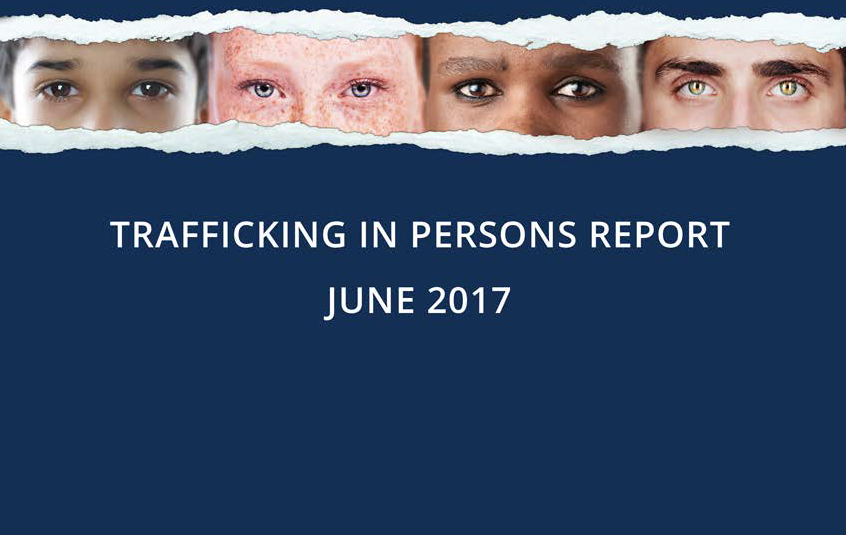On 27 June 2017, the US Department of State released its 2017 Trafficking in Persons (TIP) report, including a country narrative for Bahrain. The report Assigned Bahrain Tier 2 status, indicating the government “does not fully meet the minimum standards for the elimination of trafficking,” but is “making significant efforts to do so.” Americans for Democracy & Human Rights in Bahrain (ADHRB) welcomes the State Department’s continued engagement on the problem of human trafficking in Bahrain and calls on the Bahraini government to implement the recommendations of the TIP report.
According to the State Department, the Bahraini government demonstrated growing efforts to eliminate trafficking by developing a national referral mechanism and investigating potential trafficking cases throughout the year, including several that implicated government officials. Rates of referral for recruitment agencies allegedly implicated in abusive practices increased. Bahraini authorities reportedly focused efforts on “expanding victim assistance, broadening training for government personnel, and raising awareness among Bahraini society and labor-sending communities.” The Bahraini government told the State Department that it informed every victim of their legal right to restitution in the event of a conviction following investigation.
However, the State Department found that, because of a high level of distrust in the Bahraini legal system among workers, it is likely that only a small portion of those affected filed complaints concerning abuse. This trust deficit was exacerbated by continued reports of “official complicity.” Additionally, some migrant workers refused to contact the police after experiencing abuse due to being “free visa” holders, or laborers who work for a non-sponsor employer and therefore do not possess legal working status. Although workers are permitted to change sponsorship during an investigation, there were only five reported cases of workers actually taking advantage of this process.
Similarly, the State Department reported that the Bahraini government failed to take concrete steps to amend elements of the kafala sponsorship system – the underlying framework governing migrant labor which is linked to a variety of severe rights violations. Both government and independent organizations documented numerous cases of abuse, including physical and sexual assault, but the national referral mechanism created to protect victims did not report how many it had yet identified. The government particularly “made minimal efforts to proactively identify potential forced labor victims.”
In addition, the authorities conducted only 29 trafficking-related investigations during the reporting period, and the Ministry of Justice and Islamic Affairs received just 25 for consideration. The State Department reported that Bahraini courts convicted three traffickers and sentenced them each to five years in prison; it is unclear if these are the only cases to result in convictions during the reporting period, but it suggests that prosecution rates remain low. Overall, prosecution rates declined since the previous reporting period. Moreover, incidents such as “withheld wages, passport retention, and analogous abuses…were not often investigated for trafficking crimes despite exhibiting indicators of the crime.”
Notwithstanding the several positive developments noted by the TIP report, ADHRB echoes the State Department’s concerns that the Bahraini government has failed to make sufficient reforms to the kafala system and existing labor laws – root causes of the country’s trafficking and migrant abuse problems. In December 2016, Alsharq al-Awsat newspaper reported the Bahraini government would officially abolish the kafala system starting in April 2017. However in the government’s report to the United Nations (UN) Universal Periodic Review (UPR) Working Group in February 2017, it described the “abolition” process as a smaller-scale test program granting approximately 48,000 work permits to foreigners without sponsors. Although this is a step towards alleviating migrant worker abuses, the government has not provided additional information on the program’s launch or progress, and it does constitute full abolition.
ADHRB also notes that the TIP report did not fully address some factors aggravating the problems of human trafficking and migrant labor exploitation in Bahrain, such as expatriate ineligibility for minimum wage. Because employers often withhold migrant workers’ wages or pay them substantially less than what they were promised, this places them at increased risk of debt bondage and forced labor. Just this month nearly a hundred migrant workers, primarily from India and Bangladesh, launched a demonstration to protest months of unpaid wages. Yet the Bahraini government has begun negotiating with major migrant labor source countries to reduce existing safeguards, as in February 2017 when the Labor Market Regulatory Authority (LMRA) announced that Bahrain and India were reviewing a proposal to terminate an arrangement to protect domestic workers from abuses including arbitrary withholding of wages. Though the State Department noted that some workers were subjected to non-payment of wages, it was unable to document the number of cases for the review period and it did not recommend potential government remedies, such as the implementation of a minimum wage for migrant workers.
The US Department of State ultimately recommends the Bahraini authorities “increase their efforts to investigate, prosecute, and convict traffickers, abolish the sponsorship system, implement procedures to identify trafficking victims among vulnerable groups, and extend the flexible work permit program.” It also calls on the government to work toward “expanding and actively enforcing labor law protections for domestic workers, and ensuring trafficking victims are not punished for acts committed as a result of being subjected to trafficking.”
ADHRB encourages the Department of State to continue documenting abuses in Bahrain, as well as to urge the Bahraini authorities to guarantee the rights of migrant workers and victims of human trafficking. We call on the Government of Bahrain to address the concerns raised in the State Department’s TIP report and to implement its recommendations to improve labor conditions and eliminate human trafficking.





